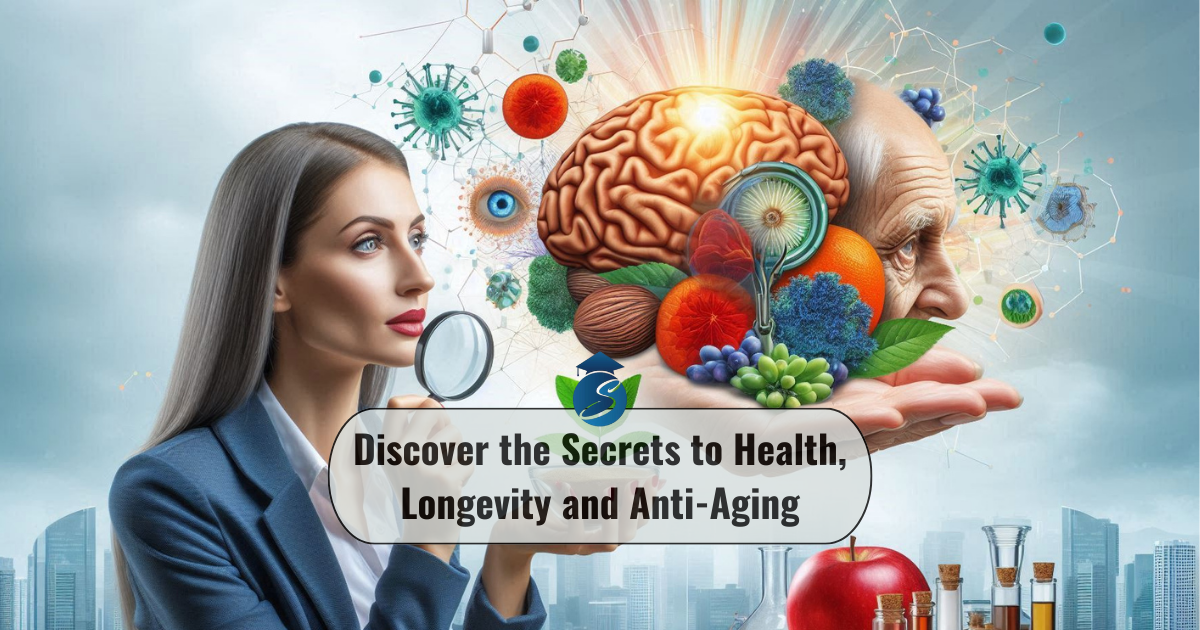Unlocking the Secrets to Longevity and Anti-Aging
If you’ve noticed a sudden increase in wrinkles, general aches, or a sense that you’ve aged suddenly, there could be a scientific explanation. Recent research suggests that aging may not progress at a constant rate but instead occurs in bursts.
In a study analyzing thousands of molecules from individuals aged 25 to 75, scientists identified two main surges in age-related changes: one around age 44 and another at 60.
These “waves” of aging might explain why certain health issues, such as musculoskeletal pain or cardiovascular conditions, often emerge or worsen around these ages.
A Path to a Healthier, Longer Life
Aging is a natural part of life, yet the pursuit of a long, healthy existence—longevity—has fascinated humans for centuries.
Modern science has transformed our understanding of aging, uncovering methods to delay it and improve quality of life along the way.
This article will explore how engaging with the concepts of aging and longevity can empower us to make daily choices that promote a longer, healthier life.
We’ll also share some actionable strategies and give you a preview of an insightful course on longevity and anti-aging that could be your next step toward a lifetime of vitality.

Aging is not lost youth but a new stage of opportunity and strength.” — Betty Friedan
The Science Behind Longevity and Anti-Aging
1. Cellular Senescence: The Roots of Aging
As we age, our cells eventually reach a point where they stop dividing and enter a phase known as cellular senescence.
While senescent cells can no longer replicate, they continue to secrete harmful inflammatory signals, contributing to diseases of aging such as heart disease, diabetes, and cancer.
Targeting senescent cells with lifestyle choices like caloric restriction (eating fewer calories while maintaining nutrition) and compounds called senolytics may reduce this process, enhancing cellular health and promoting longevity.
2. Mitochondrial Health: Powering the Cells
The health of our mitochondria, often termed “the powerhouse of the cell,” also influences how we age. Mitochondria help produce energy and manage cellular health, but as they age, they become less efficient, leading to increased fatigue and age-related diseases.
Fortunately, you can maintain mitochondrial health with aerobic exercise (think brisk walking or cycling) and supplements such as Coenzyme Q10 (CoQ10), which supports cellular energy production.
3. Telomere Shortening: Guarding Our DNA
Telomeres are protective caps at the ends of chromosomes, preventing DNA damage during cell division. Each time a cell divides, telomeres shorten, and once they’re too short, cells enter senescence or die.
Studies show that stress and poor lifestyle choices accelerate telomere shortening, increasing the risk of aging-related diseases.
By managing stress effectively, eating a diet rich in antioxidants, and getting regular exercise, you can help preserve telomere length, supporting longevity.

Understanding the Impact of Stress on Aging
Stress is an inevitable part of life, yet chronic stress can accelerate aging through elevated cortisol levels, which increase inflammation and suppress the immune system.
Taking time to cultivate stress-management habits can make a profound difference. Consider adding a regular mindfulness practice such as meditation or deep breathing exercises to your routine, which can lower cortisol levels and improve your resilience to stress.
Actionable Steps to Manage Stress for Longevity:
- Mindful Breathing: Practice deep breathing exercises for 5 minutes daily to centre the mind and reduce stress.
- Daily Exercise: Engaging in at least 20 minutes of physical activity, like brisk walking or yoga, lowers cortisol levels and boosts mood.
- Social Connections: Strong social bonds are associated with longer life; take time to engage in meaningful relationships or community activities, whether it’s meeting friends or volunteering.

Nutritional Strategies for Longevity
A balanced diet rich in essential nutrients can significantly impact the aging process. Here are some key dietary approaches that can promote longevity and combat cellular aging:
1. Caloric Restriction and Intermittent Fasting
Caloric restriction (CR) without malnutrition has been shown to extend lifespan in animals, likely due to reduced oxidative damage and inflammation.
Intermittent fasting (IF) mimics some effects of CR, promoting autophagy—a cellular cleanup process where damaged cells are broken down and removed. Start by trying a 12-hour fast overnight, which can be as simple as having an early dinner and delaying breakfast.
2. Anti-Aging Nutrients and Foods
Certain foods and nutrients combat the oxidative stress that accelerates aging:
- Omega-3 Fatty Acids: Found in fatty fish, omega-3s reduce inflammation and support brain health.
- Antioxidants: Include foods like berries, dark chocolate, and green tea to combat oxidative stress.
- Resveratrol and Polyphenols: Resveratrol, found in red wine, activates longevity-related proteins called sirtuins. Polyphenols in fruits, vegetables, and olive oil protect against diseases linked to aging.

Exercise: A Key to a Long, Active Life
Exercise is a cornerstone of anti-aging science. It not only improves cardiovascular and metabolic health but also strengthens muscles and enhances mental well-being.
Incorporating a mix of aerobic, strength, and flexibility exercises, like yoga, can make a notable difference in your overall health as you age.
Actionable Steps for Exercise and Longevity:
- Aerobic Exercise: Try 150 minutes of moderate aerobic activity weekly, which could include walking, cycling, or swimming.
- Strength Training: Aim for two strength-training sessions each week to preserve muscle mass and maintain metabolic health.
- Flexibility and Balance: Practise yoga or tai chi for flexibility, balance, and reduced risk of falls.
Mental and Social Aspects of Longevity
Mental well-being and strong social connections can also promote longevity. Research shows that loneliness and social isolation contribute to early mortality, while strong relationships reduce stress and enhance quality of life.
Prioritising mental health and social bonds supports a longer life and enriches daily experiences.
“Longevity is not simply a matter of adding years to your life, but adding life to your years.” — Stuart McGill
Actionable Steps to Foster Social Connections:
- Join community groups or classes to meet new people.
- Volunteer for a cause you’re passionate about.
- Dedicate regular time to friends and family, which can lower stress and boost happiness.
Advanced Longevity Science: Exploring New Frontiers
Cutting-edge scientific developments, such as gene therapy, CRISPR gene-editing technology, and senolytics (drugs targeting aging cells), offer hope for future advances in anti-aging.
While these technologies are still in development, they hold potential for individuals to one day extend lifespan safely and effectively.
Taking the Next Step: Learn More About Longevity and Anti-Aging
If you’re ready to take your longevity knowledge to the next level, consider enrolling in our comprehensive Longevity and Anti-Aging Course.
This course covers essential topics, such as cellular aging, nutrition for longevity, stress management techniques, exercise strategies, and emerging scientific research in anti-aging.
You’ll also receive 8 hours of CPD/CE certification, making it an excellent choice for those in health-related fields or anyone interested in lifelong wellness.
Through the course, you’ll gain practical, actionable insights that will empower you to make informed decisions on aging well.
The best part? You’ll have access to supporting videos, interactive modules, and community forums to enhance your learning experience. And, you can use this link to get a huge 25% off the course price.
In Summary
Learning about longevity and anti-aging isn’t just for those looking to extend their years; it’s about improving quality of life today and building a foundation for health tomorrow.
From managing stress and optimising nutrition to maintaining social connections, each small step adds up in the journey toward a long, vibrant life. Why not take that step today? Remember, you can save 25% today using this link!
Dr Tom Barber is a #1 bestselling author, integrative and existential psychotherapist and coach, supervisor, researcher, speaker, and co-founder of Self Help School. His work has spanned nearing 30 years, in which he has focussed on helping people all over the world to improve their knowledge and understanding of their psychological worlds. Tom regularly delivers courses and lectures in the UK, USA, Canada, Mexico, and across Europe. In addition, he maintains a private therapy and coaching consultancy from his base in Essex, and online.


